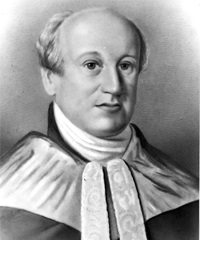
Date of Birth: 31/01/1794
Place of Birth: Daventry, Northamptonshire, England
Date of Death: 06/08/1888
Place of Death: London, England
Parliamentary Service
| President of the Legislative Council |
09 Feb 1858 |
10 May 1861 |
3 years 3 months 2 days |
|
| Member of the NSW Legislative Council |
11 Aug 1857 |
10 May 1861 |
3 years 9 months |
Quinquennial appointment under the Constitution Act; Date of Writ of Summons 9 July 1857 |
Qualifications, occupations and interests
Lawyer (barrister). Educated at Daventry Grammar School. Was a retired Judge when he was appointed to the Legislative Council. Early career was in the Royal Navy, which he entered as a midshipman in 1807. Sailed to Lisbon, Cadiz, the Canaries, the Mediterannean, West Indies, China and the East. Called to the Bar at Inner Temple in 1824. Recorder at Daventry and President of the Local Court of Quarter Sessions 1826 - 1827. Conveyancer and a special pleader. Became a second puisine judge at the Cape of Good Hope in 1828 and a judge to the New South Wales Supreme Court in 1832. Took leave to travel to Great Britain in 1839 to 1841. Returned to New South Wales in 1832 and became a judge of the Supreme Court in Madras in 1844 . Returned to Sydney in 1857. Resigned from the Legislative Council after the 'swamping' in 1861 and left New South Wales in disgust.
Military Service
Active service in the Royal Navy at New Orleans and Toulon, where he was wounded.
Honours Received
Knight Bachelor in 1844.
Membership of other Parliaments & Offices Held
Local Government Activity
Personal
Son of Edmond Burton, solicitor and town clerk, and Elizabeth Mather. Married (1) Margaret Smith on 15 April 1827 and had no issue. Married (2) Maria Alphonsine West and had no issue. Church of England.
Additional Information
Biography and portrait in ‘Australian Men of Mark’, Volume 1. Sydney, [?1889] ,
page 57
Personal papers in the Mitchell Library, State Library of New South Wales: Sir
William Westbrook Burton - correspondence 1832 - 1838 (MLMSS 834);
Australian Dictionary of Biography, volume one
Text from the book "The Presiding Officers of Parliament of New South Wales"
Sydney 1995
William Burton was born on 31 January 1794 in Northamptonshire, England. He
married twice, first to Margaret Smith in 1827 and secondly (date unknown) to
Maria West. He had no children. Educated in England, Burton served in the Navy
for several years before completing his legal studies. During his appointment
to the Supreme Court at the Cape of Good Hope, he met Governor Bourke and
accepted his offer of a position on the Supreme Court of New South Wales. Upon
arriving in New South Wales in 1832, Burton was appalled by what he considered
a lack of religious direction in the colony. Yet despite his religious fervour
Burton came under attack for intolerant displays towards Catholics in his court
room. He played an important role in the formation of early colonial law,
although he tended to adhere closely to examples as set by English law. Burton
provided two important judicial decisions in relation to the status of
Aboriginals under English law, arguing through his rulings that if Aboriginals
were to be subject to English law, then they should also be protected by it.
Burton left New South Wales for India for a period of thirteen years, as a
Judge of the Supreme Court in Madras, and although little is known of his life
throughout that period, his first wife died suddenly and he remarried.
Returning to Australia in 1857, he was appointed to the Legislative Council and
the following year was appointed President. His dramatic resignation as both
President and a Member of the House caused a great sensation. In an attempt to
ease the Robertson Land Bill through the upper house, Premier Cowper attempted
to appoint twenty one new members to the Legislative Council without consulting
Burton. Although the Bill had successfully passed through the lower house it
had been rejected by the upper house. Following Burton's resignation, John
Robertson resigned his lower house seat and was nominated to the Legislative
Council where he secured the passage of the Bill. Burton left Sydney in disgust
in 1861 and returned to London where he died on 6 August 1888.
Politics, Ideology and the New South Wales Legislative Council 1856-72 (PhD
thesis, University of Sydney, 1962.)
